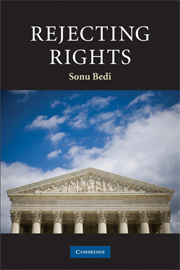Book contents
- Frontmatter
- Contents
- Acknowledgements
- Table of cases
- Introduction
- Part I Rights
- Part II Justification in theory
- Part III Justification in practice
- 6 Rejecting the constitutional rights to property and religion
- 7 Rejecting the constitutional right to privacy
- 8 Equal protection and judicial review
- Conclusion
- Bibliography
- Index
6 - Rejecting the constitutional rights to property and religion
Published online by Cambridge University Press: 01 July 2009
- Frontmatter
- Contents
- Acknowledgements
- Table of cases
- Introduction
- Part I Rights
- Part II Justification in theory
- Part III Justification in practice
- 6 Rejecting the constitutional rights to property and religion
- 7 Rejecting the constitutional right to privacy
- 8 Equal protection and judicial review
- Conclusion
- Bibliography
- Index
Summary
I argue in the last and third part of my book that American constitutional law has moved in the direction of my theory of Justification rejecting the rights of the private sphere and should continue to do so. Properly understood, I argue that Supreme Court case law informs the re-conceptualized account of limited government proffered in Part II. In this Part, we revisit my argument but through the lens of constitutional decision-making. The Court already engages in the practice of looking to legislative purpose. In deciding the constitutionality of statutes, regulations, or laws, it ascertains and evaluates their intent, purpose, or goal. Such an inquiry stands at the core of my theory of Justification. However, the Court also cares about rights. I concede that constitutional law can never entirely purge the language of rights. Particular clauses, the Bill of Rights and various other amendments to the Constitution no doubt create or affirm certain enumerated rights, rights that undoubtedly attach to individuals. Though, it should be noted that the original 1787 Constitution did not contain a bill of rights. Again, Alexander Hamilton argued against including one, suggesting, in fact, that such a schedule of rights is “not only unnecessary” but “dangerous.” But this is not the Constitution we have today, one where rights are an ingrained feature of the constitutional landscape. Thus, my constitutional argument is not nearly as broad or as comprehensive as my political theory one.
- Type
- Chapter
- Information
- Rejecting Rights , pp. 121 - 144Publisher: Cambridge University PressPrint publication year: 2009



